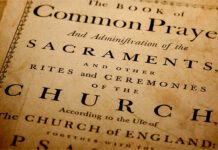To the Revd Dr Graham Tomlin
Dean, St Mellitus College:
Okay, here’s a question that’s been on my mind for a while. Obviously, as usual, no pressure to answer back. But it’s really bugging me because it affects a lot of what we do as church.
How does urgency, or even better ‘efficiency,’ figure in God’s way of working.
If I look at the way creation works – profligate and lengthy developments (see Annie Dillard’s Pilgrim at Tinker’s Creek); the way in which the Messiah came to the earth (in Palestine in the first century – rather than the emperor’s court in Rome, for example, or even London in the 21st century with the benefits of international broadcasting, international language, digital communication, etc); and how Scriptures are presented as a series of histories, poems, songs and accounts, rather than as a text book, it would seem that getting the job done as quickly as possible is not one of God’s major priorities. If speed was of high value in God’s approach, surely the Bible would start with a list of things to do: ‘Now that you are a follower of God, please note…’ with all the major doctrinal challenges clearly and speedily spelled out. Surely, Jesus would have come at a time when everyone was able to hear the good news immediately; even more to the point, surely, Jesus would have come sooner than he had…
If this is true, the injunction to make disciples of all nations is not a to do list so much as it’s a way of life…No?
Brenton
PS: I think about the anecdote that Martin Luther, when asked what he’d do if he knew the world was to end tomorrow, he said he would go out and plant a tree…
Dear Brenton,
I guess my thoughts on it are along these lines:
It does seem to me that God does take His time with most things…I would [also] argue that the very fact that creation is described as taking 7 days in Genesis, rather than an instantaneous event, suggests that God takes time over creation. Therefore, I would argue that the element of waiting and patience is built into the very account of creation itself. It seems to me that in God’s economy, a process and how things are done are every bit as much important as getting the thing done in the long-term. Therefore, speed is not necessarily of the essence. Patience is one the great qualities of the God of the Bible, which is why it needs to be one of ours as well. It does seem to me that God is more interested in the kind of people we are and become, rather than what we achieve. Having said that, creation does have a direction in Scripture. It not an aimless circular meandering process, but it does work towards a goal of the new heavens and the new earth, and therefore, it wouldn’t be entirely true to say that God has no goal or focus in what He does. God will bring about His purposes with or without us (depending on the extent to which we want to be involved). So the destination matters, but how we get there is as important as that we get there. I don’t know if this helps, but it’s an interesting set of thoughts.
With best wishes,
Graham
Revd Dr Graham Tomlin
Dean, St Mellitus College
On 7 Mar 2011, at 21:05, “Brenton Brown” wrote:
PS: It feels sometimes like mission and church organizations use the urgency of people not hearing the gospel before they die as a ‘prod’ to get their listeners moving. This may be right…but I have to ask, if God himself works at a slower pace then surely we need to factor that into our approach?
For years, I’ve probably subconsciously held the belief that if I just spoke faster, louder, and to more people during my day about the gospel, I’d be living a lot more like Jesus than I am now. It’s how my missionary grandparents lived, and they got results…Speed and boldness. But if that’s the main metric, what was Jesus doing until his public ministry began…wasting time?
On Mar 7, 2011, at 1:14 PM, Graham Tomlin wrote:
Yep, I’d go with that…I think Billy Graham said something like, ‘If I had my time over again, I would spend more time preparing for ministry like Jesus did, rather than rushing into it.’
With best wishes,
Graham
Revd Dr Graham Tomlin
Dean, St Mellitus College












